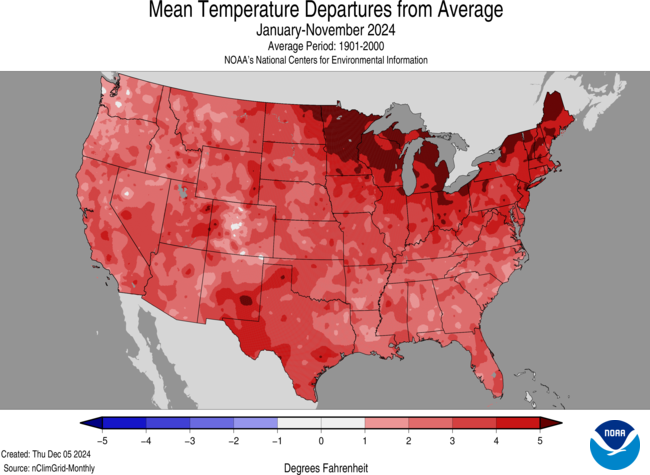When we think of typical fall weather, an image might come to mind of crisp, cool days prompting sweater weather, hot pumpkin spice lattes and an evening bonfire to stay warm.
But with the end of November prompting the closure of what was a record-setting meteorological fall (which spans from September through November), our changing climate paints a different picture — with record-setting warmth as the story of the season.
The National Oceanic and Atmospheric Administration’s (NOAA) National Centers for Environmental Information (NCEI) released its monthly climate report last month, in which scientists concluded that not only was the month of November the sixth-warmest on record, but that meteorological fall was also the warmest in recorded history. And, to date, 2024 could also hold the top spot for the warmest year as well if the trend continues up until the ball drops on New Year’s Eve.
NOAA has been keeping climate records for the past 130 years, and this year’s meteorological fall claimed the spot as warmest on record with an average temperature of 57.6 degrees Fahrenheit (14.2 degrees Celsius).
18 states experienced one of their top-three warmest falls and five states, including Maine, Wisconsin, Texas, Nebraska, and Minnesota, saw their warmest in recorded history. In addition, the three month-span was also the driest on record for Maine, New Jersey, Delaware, and Connecticut.
The U.S. seasonal precipitation total for fall came in 0.65 inches (0.02 meters) below average at 6.23 inches (0.2 meters), making the 2024 meteorological fall also the third driest on record.
If the abnormally warm temperature trend continues through December, 2024 could end up being the warmest year in recorded history. From Jan. 1 through Nov. 30, the average temperature sits 3.3 degrees higher than average at 57.1 degrees Fahrenheit (13.9 degrees Celsius).

Additionally, 22 states so far remain in the top spot for having their warmest year on record, following suit with above average temperatures dominating for the same time frame.
With sea-surface temperatures remaining elevated from the continual warming this year, it’s no surprise 2024 was also a historic year for the Atlantic hurricane season, which came to a close on Nov. 30.
The season, which officially began June 1, was above-average as forecasters predicted, with a total of 18 named tropical systems with almost a dozen of the storms strengthening into hurricanes.
2024 tied 1893, 2004, and 2005 for fourth place having the most landfalling storms in a season, and awaiting final estimations, it will likely be one of the costliest on record.










Leave a Comment